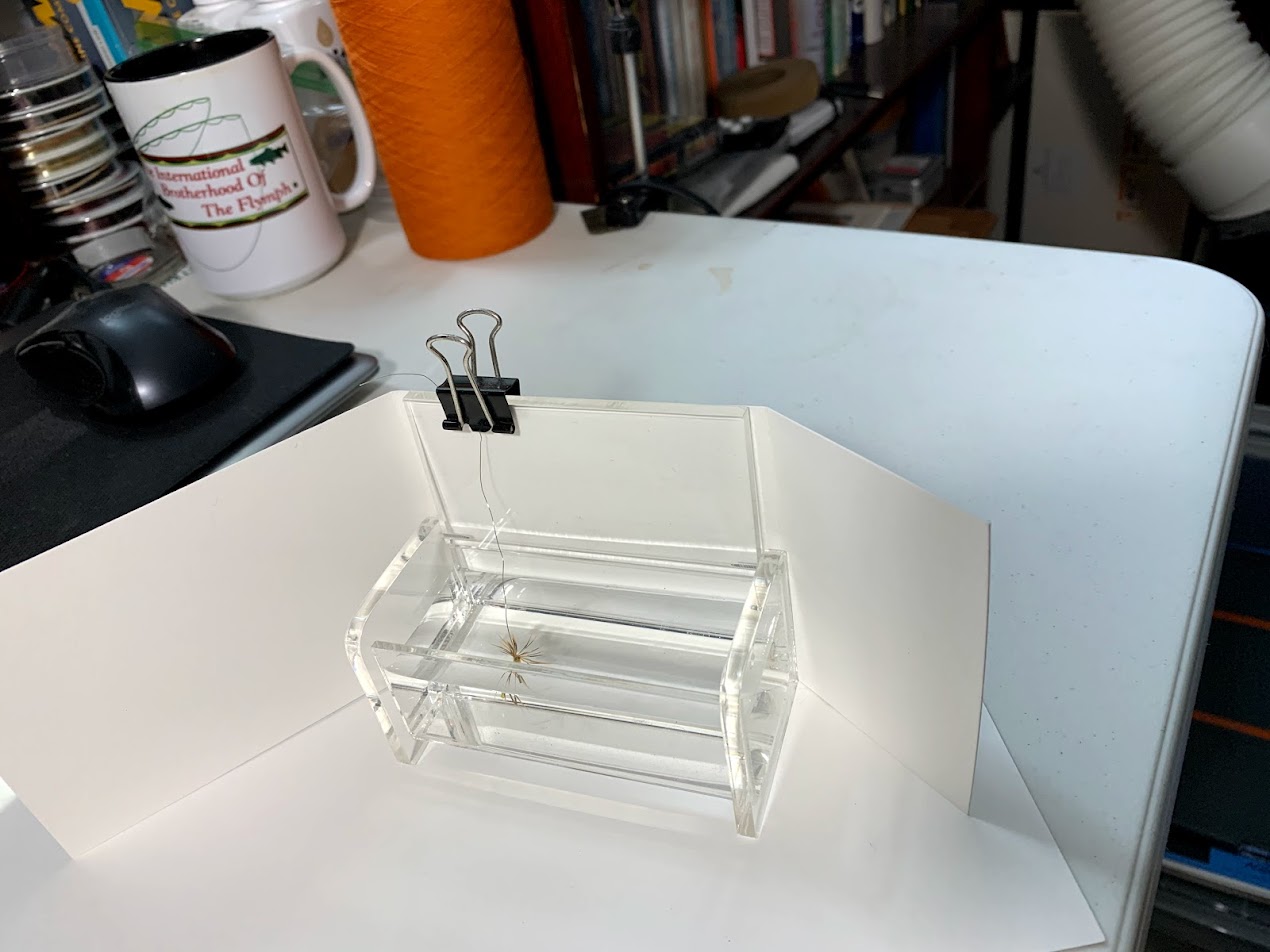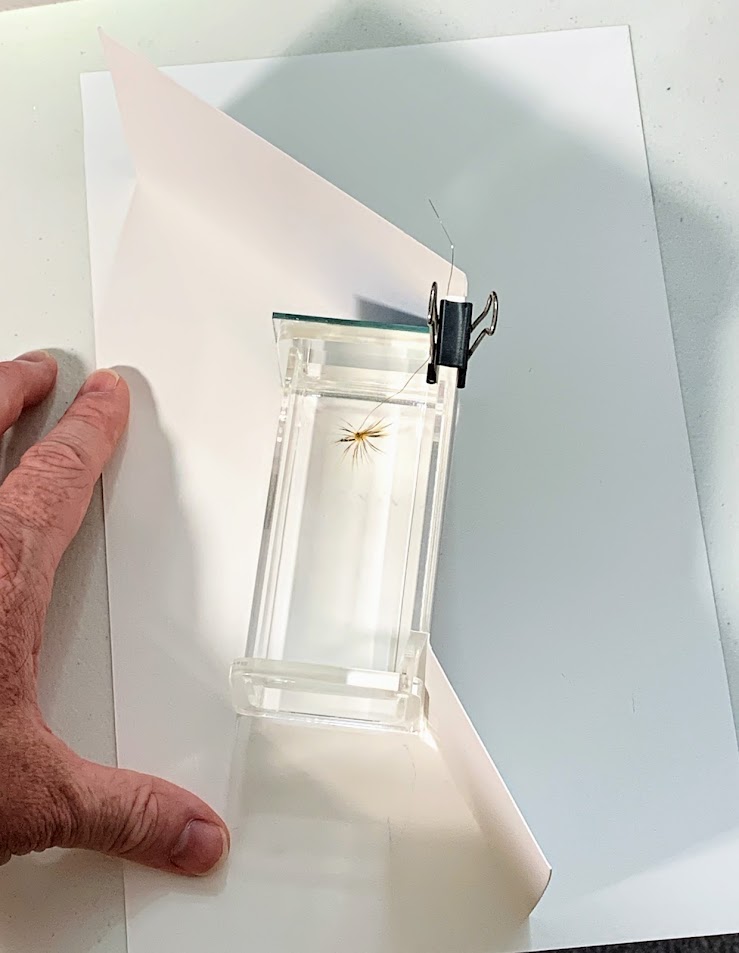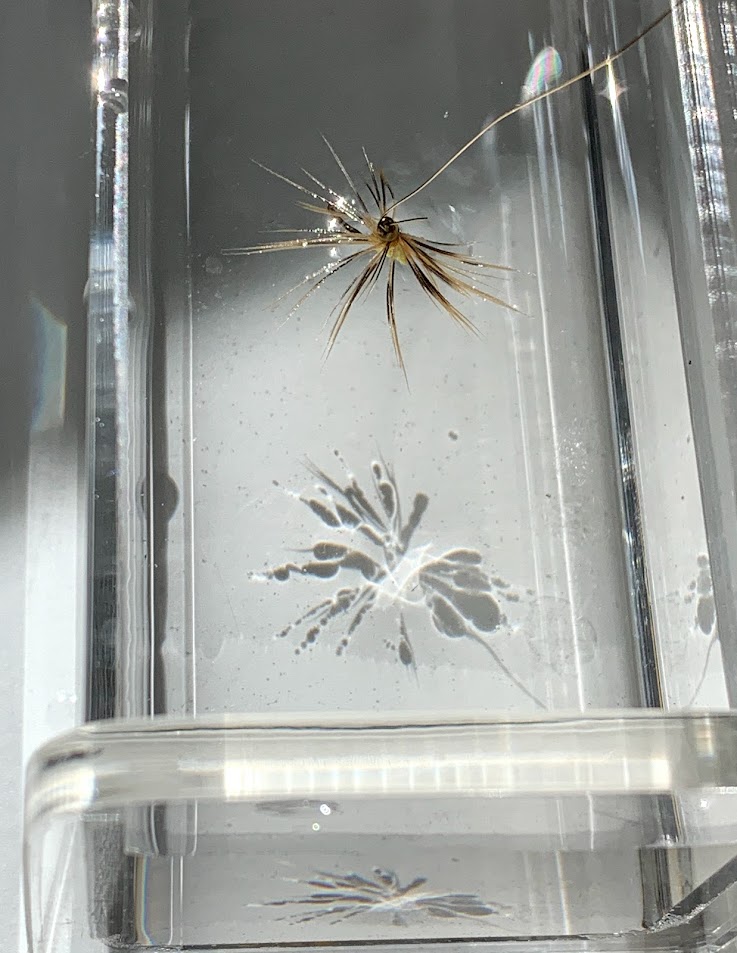Page 1 of 2
Micro Fishing Photo Tank - Inexpensive Under Water Photo Set Up
Posted: Mon Jul 20, 2020 5:37 pm
by letumgo
A few year ago I purchased this micro fishing photo tank from Chris Stewart (Tenkara Bum), to visualize flies under water. This weekend I pulled it out again and started playing around with it to photograph soft hackle flies under water.
I made up a small background/bottom out of white water color paper. The white paper helps brighten the background and reflect additional light into the tank, onto the fly. A couple small mirrors are also handy. The whole setup is less than ten bucks. Easy to set up and adjust. Easy to store. And a fun way to play around, while learning how fly patterns behave on/in water, and look like underwater.
Basis Set Up (Tank/Paper Clip/Fine copper wire):



Fly held in place with small binder clip. Quick and easy adjustment of fly position.

The end flaps can be bent backwards/forwards to allow better viewing angles (don't forget the end of the tank).

Placing the fly at the far end, allows reflection of the fly to show different angles in the near side.

Depending on viewing angle, you can see multiple images/angles of the same fly.




Re: Micro Fishing Photo Tank - Inexpensive Under Water Photo Set Up
Posted: Tue Jul 21, 2020 9:42 am
by hankaye
Ray, Howdy;
Rainy day, got all the other chores accomplished ???
Just a few moments of idle time on your hands?

An engineer's mind at rest is a terrible thing to see,
although the results are at times like this very pleasing
to witness.

Thanks Ray for bringing us along once more.
hank
Re: Micro Fishing Photo Tank - Inexpensive Under Water Photo Set Up
Posted: Tue Jul 21, 2020 11:40 am
by letumgo
Re: Micro Fishing Photo Tank - Inexpensive Under Water Photo Set Up
Posted: Tue Jul 21, 2020 12:50 pm
by ronr
you are giving away all of your secrets... those are great images, especially the reflected view from the bottom of the fly..
Re: Micro Fishing Photo Tank - Inexpensive Under Water Photo Set Up
Posted: Tue Jul 21, 2020 1:48 pm
by Variant
Great post Ray,
I dunk all my wet flies and flymphs, it really shows their true colors. I think light pattern is very important with patterns in or near the surface.
Re: Micro Fishing Photo Tank - Inexpensive Under Water Photo Set Up
Posted: Wed Jul 22, 2020 8:40 am
by Ron Eagle Elk
I use my mini dunk tank (thanks for the idea, Ray) when tying at expos so people can see the color change of the silk and movement of the hackles. Great idea for the photos, Ray. I'll have to give that a try.
Re: Micro Fishing Photo Tank - Inexpensive Under Water Photo Set Up
Posted: Wed Jul 22, 2020 8:42 am
by bearbutt
Cool set-up, Ray--I like it a lot.
John, I agree about the lack of movement of the soft hackles is surprising--I've seen this with flatwing streamers too--but have seen flashabou respond very well to subtle currents. I wonder if there's a market here for a supersoft synthetic hackle? The ways the barb is attached to the rachis is part of evolutionary efficiency--to keep birds aloft in the air--lol. So even while the barb might be soft, the joint is not--.
Apropos of this photo, your tippet knot stood out, and the shine of the mono is unmistakable:

What are you using for mono?--It's really catching the light. Curious to see what it looks like if you use a stained mono--or Chameleon?
bb
Re: Micro Fishing Photo Tank - Inexpensive Under Water Photo Set Up
Posted: Wed Jul 22, 2020 1:37 pm
by PhilA
Very nice photos gents. Ray, I especially like the light imprint of the floating spider.
John, a couple of thoughts about the lack of underwater movement...
Water currents are probably a big part of underwater hackle movement. Good luck working in a fast-flowing river though. That sounds like difficult photography to me. A video would probably show the movement best.
Hen hackle (at least, modern hen hackle) is much stiffer than that of game birds. You might try flies hackled with feathers from the many game birds that we soft-hackled devotees covet and hoard.
For anyone interested in how flies appear at or near the surface, I highly recommend reading The Fly-Fisher and the Trout's Point of View (1931) by Col. E.W. Harding. He was the great pioneer of trout perception vis-à-vis behavior. His book describes what trout see underwater and how they respond to natural insects and artificial flies. It is rich with insights that are not so obvious.
Harding's most significant insights arguably concerned the light pattern of insects floating at the surface. Cohesive forces between water molecules at the surface are remarkably potent. They cause a thin layer to be rubbery, elastic, surprisingly sturdy, and relatively difficult to penetrate. This surface tension underlies the time-honored parlor trick of floating a needle on water, and it is crucial to a trout's perception of insects floating at the surface. Points of contact between the water and insect (body, legs, wings, etc.) create crescent-shaped surface deformations that admit light underwater visible to trout well outside of their overhead window. Each insect species yields a unique light pattern, which allows trout to identify approaching insects long before they are seen directly in the window. Harding maintained that matching surface light patterns is as important or possibly more important than matching size, profile, and color. He described splitting of the nymphal skin, wiggling motions of emerging duns, and the resulting fireworks of pinpoint light visible to trout. Harding's concept of imitating light imprints of emergers was true thinking "outside the box", and it may explain why some very successful flies appear unlike natural insects. Such flies would imitate the light pattern of emergers, rather than the insect itself. For example, Harding suggested that wingless wets and Derbyshire Bumbles are so effective at the surface because they imitate the disheveled light imprints of emerging nymphs and pupae.
Phil
Re: Micro Fishing Photo Tank - Inexpensive Under Water Photo Set Up
Posted: Thu Jul 23, 2020 7:12 am
by Tom Smithwick
Now you guys have me thinking, which is usually a dangerous thing. Ray, how about adding a small slow speed, or variable speed electric motor to the setup? The motor has a cam shaped drum on its shaft, placed so that it just touches the line that hangs the fly into the tank. When the motor turns, it vibrates the line, so you can watch the hackles twitch.
Re: Micro Fishing Photo Tank - Inexpensive Under Water Photo Set Up
Posted: Thu Jul 23, 2020 11:56 am
by letumgo
Outstanding!










